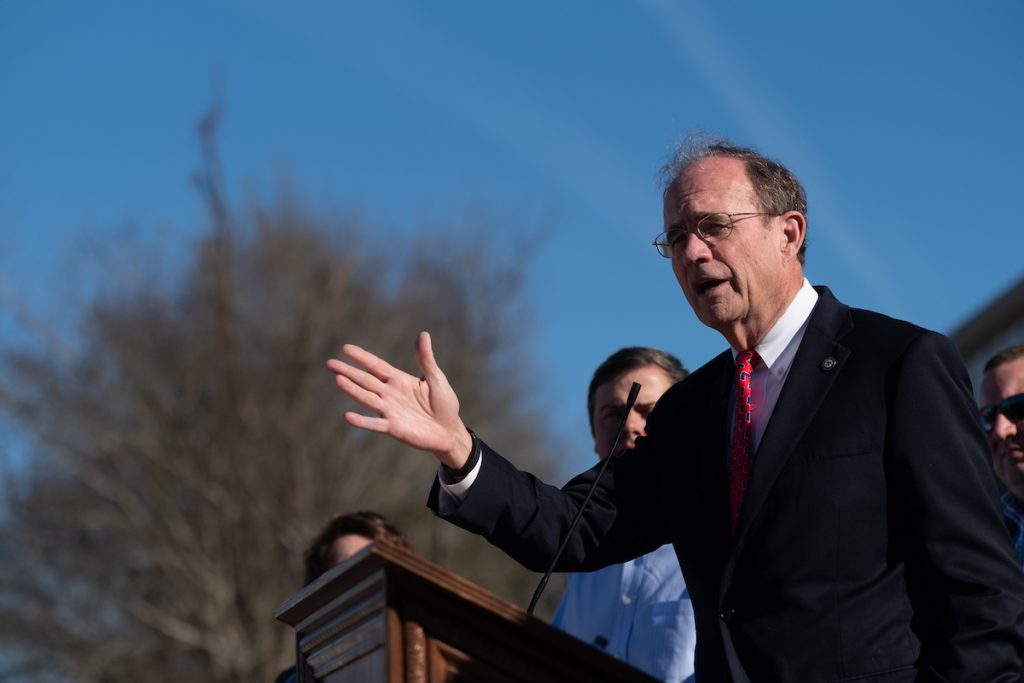The Mississippi Supreme Court should immediately impose a moratorium on evictions during the COVID-19 pandemic “to prevent the expected and unprecedented rise in Mississippians being made homeless from evictions,” the Mississippi Center for Justice said in an emergency court filing on April 24.
Mississippi Gov. Tate Reeves has ordered a moratorium on evictions until May 11, but with unemployment skyrocketing as the state’s confirmed novel coronavirus case total exceeded 6,000 on Monday, the State should follow federal guidance and extend it until at least July 27, the organization said in its filing.
In late March, Congress passed the Coronavirus Aid, Relief, and Economy Security Act, known as the CARES Act, which halted evictions for rent nonpayment and barred landlords from charging late rent fees for four months. The CARES Act, though, only protects some tenants who reside in Mississippi and live in properties involved in federal programs, like Section 8 Housing and other programs that the U.S. Departments of Housing and Urban Development, Agriculture and Treasury administer.
“Everything is covered under the governor’s moratorium,” but it does not last long enough, William Bedwell, a staff attorney at the Center for Justice, told the Mississippi Free Press Monday.
The Center describes itself as “a nonprofit, public interest law firm committed to advancing racial and economic justice.”
“We’re asking the Mississippi Supreme Court to tell justice-court judges not to hold eviction proceedings through July 27th, and that if they do hold a proceeding after that, not to let a landlord bring any additional penalties,” Bedwell said.
CARES Act Could Offer Emergency Rent Help
Renters make up about 350,000 Mississippi households, or about one-third of all households statewide, the Center’s filing says. By Friday, about 130,000 Mississippians had already filed for unemployment since the outbreak began here in March, representing a 14,000% increase in claims.
The Center’s filing argues that “inconsistent federal and state moratoriums likely will create confusion for Mississippi Judges presiding over eviction matters, as well as for landlords and tenants.”
The CARES Act gave states the right to use funds to provide emergency rental-assistance payments for people suffering job losses, but such assistance is “not yet operational in Mississippi, leaving a gap between the governor’s order and possible future relief for tenants,” the filing says.
Mississippi is on about the same track as other states when it comes to implementing such assistance, Bedwell told the Mississippi Free Press. By July 27, he said, he is hopeful Mississippi will have the program in place to help avoid a raft of new evictions. The April 24 filing, though, suggests Mississippi could implement a moratorium exceeding the federal one. If the federal government extends the CARES Act’s eviction moratorium beyond late July, the Center argues, the State should do so, too.
Whenever the moratorium ends, landlords would be able to begin demanding potential months of missed rent and evicting tenants who might still be unemployed, Bedwell said, but he hopes landlords will work to avoid immediate removals.
“At that point, landlords could start bringing evictions and asking for three months of rent, but what we’re asking for today is for people to start negotiating payment plans with their landlords,” Bedwell said.
COVID-19 Not Hitting ‘All Mississippians Equally’
In an April 2 letter, Mississippi Center for Justice President Vangela M. Wade asked Reeves to suspend evictions and take other steps to avoid calamity.

“Unfortunately, due to pre-existing health inequities, weak health care infrastructure, and high rates of uninsured individuals, Mississippians are extremely vulnerable to COVID-19-related deaths. Mississippians face the highest rates of heart disease and adult obesity in the nation—comorbidities that increase the risk of COVID-19-related mortality,” Wade wrote.
“While COVID-19 will have long-lasting impacts on our state’s collective health, safety, stability, and economy, it will not affect all Mississippians equally. Already, the crisis is amplifying Mississippi’s staggering economic and racial inequities.”
Wade also noted that “public health emergencies have a record of disproportionately burdening communities of color and women.” Since early April, the Mississippi State Department of Health has released data showing that African Americans, who make up about 38% of Mississippi’s population, account for the majority of cases and deaths statewide. State Health Officer Dr. Thomas Dobbs also confirmed last week that women make up a disproportionate number of COVID-19 illnesses and deaths.
“Many of our most vulnerable residents and communities—many of whom already lack health insurance as well as adequate funds for groceries, rent, and other basic needs—do not have enough money in the bank to prepare for quarantine and widespread economic disruption,” the April 2 letter reads.
Legislature Returns May 18
Wade’s letter cited Medicaid expansion as “perhaps the most important thing our state can do right now to protect families from COVID-19.” Reeves, a Republican, has long opposed Medicaid expansion, which he derisively referred to as “Obamacare expansion” during last year’s gubernatorial campaign.
But Mississippi’s top legislative leader, Republican Lt. Gov. Delbert Hosemann, who serves as the president of the Mississippi Senate, repeatedly expressed a willingness to pursue expansion last year under the banner of “Medicaid reform.” Experts estimate that between 100,000 and 300,000 Mississippians would gain health insurance if the state chose to pursue expansion, with black Mississippians disproportionately benefitting.

The Mississippi Legislature suspended its 2020 session in mid-March as the state confirmed that a COVID-19 outbreak was quickly spreading across the State.
Hosemann has not indicated whether or not he will pursue expansion this year. On Monday, though, the lieutenant governor announced during a press conference that legislators will resume with a condensed session beginning May 18 and concluding by the end of June.
In light of some expert predictions that the country could see a coronavirus resurgence in the fall, Hosemann said he is looking into the possibility that the State may have to adjust its voting processes if that happens.
Information on coronavirus prevention measures is available at the University of Mississippi Medical center’s website at umc.edu/coronavirus and at cdc.gov/coronavirus.
The Mississippi Free Press has an interactive map showing diagnosed coronavirus cases across the state and one showing the number of ICU beds in counties across the state.










